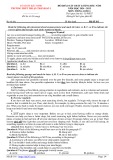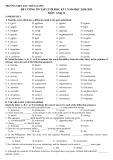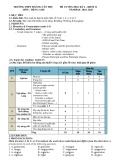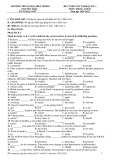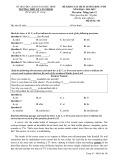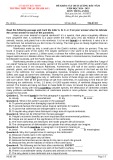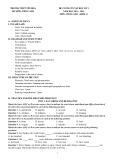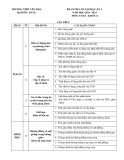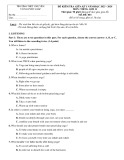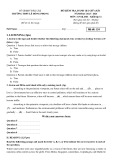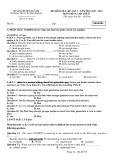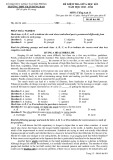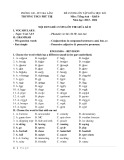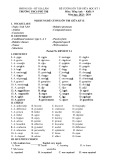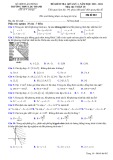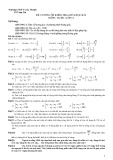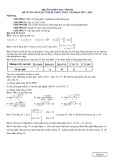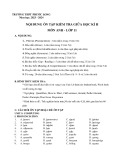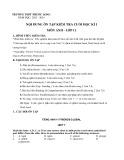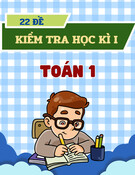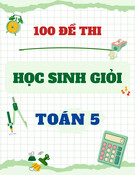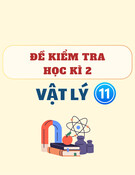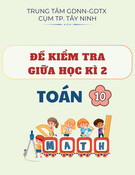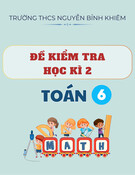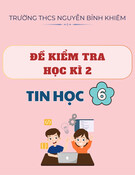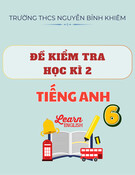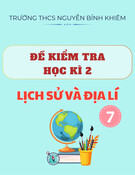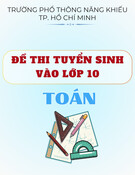TRƯỜNG TRUNG HỌC PHỔ THÔNG PHẠM PHÚ THỨ TỔ NGOẠI NGỮ
HƯỚNG DẪN ÔN TẬP KIỂM TRA CUỐI HỌC KÌ I NĂM HỌC 2023-2024 MÔN: TIẾNG ANH – Lớp 11 (CT Global Success)
A. GENERAL KNOWLEDGE: Review from Unit 1 to Unit 5
I. LANGUAGE FOCUS: 1. Pronunciation: - Strong and weak forms of auxiliary verbs - Contracted forms - Linking final consosants to initial vowels - Elision of vowels - Sentence stress and rhythm 2. Vocabulary: - Review all the topic-related lexical items from Unit 1 to Unit 5 3. Grammar: 3.1. Past Simple vs. Present Perfect: PAST SIMPLE (Quá khứ đơn) PRESENT PERFECT (Hiện tại hoàn thành) Form Form
S + didn’t + V0 S + has/ have + not + V3/ed (+) S + V2/ed (-) (?) Did + S + V0? (+) S + has/ have + V3/ed (-) (?) Has/ Have + S + V3/ed?
Usage - Diễn tả một hành động xảy ra và chấm dứt hoàn toàn trong quá khứ. My mother left this city 2 years ago. - Diễn tả các hành động xảy ra liên tiếp trong quá khứ She came home, switched on the computer and checked her e-mails.
Usage - Diễn tả hành động đã xảy ra trong quá khứ nhưng kết quả vẫn còn ở hiện tại. I have lost my keys and now I can’t get inside my house. - Diễn tả hành động xảy ra trong quá khứ nhưng không rõ thời gian. She has been to the USA once before. I have read this book three times. - Diễn tả hành động bắt đầu trong quá khứ, kéo dài đến hiện tại và có khả năng tiếp tục ở tương lai. Mary has lived in this town for ten years. Signal words/ phrases ever, never, just, already, recently, lately, since, for, twice, many times, yet, so far, up to now, over the last few weeks,… Signal words/ phrases last night/ week/ month/ year, yesterday, ago (2 years ago), in January, in 1999, when + S + V (when I was a child),.. 3.2. Modal verbs: must, have to and should
Modal Verb Use Example
Must (Phải, Cần phải) Diễn tả sự bắt buộc, sự cần thiết phải làm điều gì (mang tính chủ quan, tự người nói quyết định điều đó là cần thiết) I must finish this exercise by the evening. Tôi phải hoàn thành bài tập này vào buổi tối. (Tự bản thân thấy đó là điều cần thiết, không ai bắt buộc)
Have to (Phải, Cần phải) Diễn tả sự bắt buộc, sự cần thiết phải làm điều gì (mang tính khách quan, dùng khi nói về quy định, luật lệ bắt buộc phải tuân theo) We have to wear uniforms every day. Chúng tôi phải mặc đồng phục mỗi ngày. (Nhà trường quy định học sinh phải làm điều đó)
Should (Nên) Được dùng để đưa lời khuyên, đưa ra gợi ý hay ý kiến You should eat more vegetables. They are good for you. Bạn nên ăn nhiều rau hơn. Chúng tốt cho bạn.
Revision for End-of-term Test – English 11 – Pham Phu Thu High School
-Page 1-
Mustn’t (Không được) Dùng khi cấm một việc gì đó hay diễn tả ý không được phép làm gì We mustn’t touch it. Chúng ta không được chạm vào nó.
Diễn tả một việc gì đó là không cần thiết Don’t/ Doesn’t have to (Không cần phải) You don’t have to drive me home. I can take a taxi. Bạn không cần phải lái xe đưa tôi về nhà. Tôi có thể bắt taxi.
3.3. Stative Verbs and Linking Verbs: a) Stative verbs in the continuous form: (Động từ trạng thái ở hình thức tiếp diễn) - Động từ trạng thái mô tả một tình trạng, trạng thái thay vì một hành động. - Chúng thường ám chỉ suy nghĩ và ý kiến, cảm giác và cảm xúc, giác quan, và sự sở hữu,…. - Chúng thường không được dùng trong các thì tiếp diễn.
Example Use Stative verbs often refer to:
Thoughts and opinions Động từ chỉ suy nghĩ và quan điểm agree, believe, doubt, expect, guess, imagine, know, mean, recognize, remember, suspect, suppose, think, understand, know
Feelings and emotions Động từ chỉ tình cảm, cảm xúc dislike, detest, hate, like, love, prefer, want, wish, need, enjoy, satisfy
feel, hear, see, smell, taste, look, sound, seem, appear, be Senses and perceptions Động từ chỉ giác quan, nhận thức
Possession and measurement Động từ chỉ sở hữu và đo lường belong to, have, own, consist of, possess, include, involve, measure, weigh
* Notes:
Stative Verbs Action Verbs Verbs Example Example Meaning Meaning
Think He thinks he’s really clever. I’m thinking about his offer. Suy nghĩ Cân nhắc Xem xét Nghĩ rằng Cho rằng Tin rằng
Taste Có vị This tastes salty. Nếm Why is he tasting the soup?
He has two houses She’s having a shower. Have Ăn, uống, tắm,.. Có Sở hữu
The silk shirt feels soft. Sờ, chạm Ann is feeling the cat’s fur. Feel Cảm thấy, cảm giác
Gặp I’m seeing Paula tonight. See I see what you mean! Do you see those birds? Hiểu Nhìn thấy
Có mùi Your perfume smells of apples. Ngửi She is smelling the roses. Smell
Thích I enjoy good films. Tận hưởng I’m enjoying my holiday now. Enjoy
He looks tired today. Nhìn He is looking at the painting. Look Trông, nhìn có vẻ
Appear She appears to be working. Xuất hiện The singer is appearing on stage tonight. Dường như, có vẻ
Weigh Nặng He is weighing the potatoes. The box is heavy. It weighs a lot. Cân Đo
Stay Giữ, duy trì He stays calm in any situations. Tira is staying at home. Ở
Revision for End-of-term Test – English 11 – Pham Phu Thu High School
-Page 2-
b) Linking Verbs: (Động từ liên kết)
Definition Linking verbs hay còn được gọi là Động từ liên kết/ Liên động từ, làm nhiệm vụ nối giữa chủ ngữ và vị ngữ trong câu. Linking verbs không chỉ hành động mà chỉ trạng thái của sự vật/ hiện tượng/ người được nói đến.
Form Subject + Linking verb + Adjective/ Noun/ Noun Phrase
To Be Linking Verbs Five senses Linking Verbs State of Being Linking Verbs
Linking Verbs
Look/ Feel/ Taste/ Smell/ Sound Be/ Being Am/ Is/ Are Was/ Were/ Been Stay/ Remain/ Grow Get/ Become/ Turn/ Come Appear/ Seem/ Prove
from cars has Examples
for - The Air Jordan shoes were very popular with young people. - Lavendar is a fragrant herb widely used culinary purposes. - She appears happy but she is sad deep down. - Pollution become a major problem. - He remains undecided about what to do. - Your shoes look good with your new shirt. - I felt tired after the long journey. - That sounds a good idea! - Mmm! This tastes delicious!
3.4. Gerunds as subjects and objects (V-ing)
Definition Gerunds hay Danh động từ là những động từ có đuôi -ing (V-ing) và được dùng như là danh từ.
Use Examples
1.
Làm chủ ngữ của câu Travelling is my hobby. (Đi du lịch là sở thích của tôi)
2.
Làm bổ ngữ sau động từ “to be” His interest is swimming. (Sở thích của anh ấy là bơi lội)
3.
I enjoy exploring other cultures. (Tôi thích khám phá các nền văn hoá khác) Làm tân ngữ sau các động từ như avoid, consider, dislike, enjoy, finish, propose, suggest, involve, appreciate, mind, ….
4.
Làm tân ngữ sau các giới từ như in, on, at, of, with, to, for, by, without,.. I am good at baking. (Tôi giỏi làm bánh)
Common Verbs Followed By Gerunds (V-ing)
(Một số động từ được theo sau bởi V-ing)
1. allow (cho phép)
13. enjoy (thích)
26. prevent (ngăn chặn)
2. avoid (tránh)
= like/ feel like/ love/ fancy/ prefer
27. propose (đề nghị/ đề xuất)
3. admit (thừa nhận)
14. encourage (khuyến khích)
28. quit (nghỉ, thôi) = give up
4. advise (khuyên nhủ)
15. forbid (cấm)
29. recall (nhớ)
5. appreciate (đánh giá cao)
16. finish (hoàn thành)
30. recollect (nhớ ra, hồi tưởng)
6. complete (hoàn thành)
17. imagine (tưởng tượng)
31. recommend (đề xuất/ gợi ý)
7. consider (xem xét, cân nhắc)
18. involve (bao gồm)
32. regret (hối hận vì đã làm gì)
8. continue (tiếp tục)
19. include (bao gồm)
33. risk (liều)
= go on/ keep on/ carry on
20. mention (đề cập)
34. stop (dừng làm gì/ ngăn cản)
9. delay (trì hoãn)
21. mind (phiền, ngại)
35. spend (sử dụng thời gian)
10. deny (từ chối)
22. miss (nhớ, bỏ lỡ)
36. suggest (đề nghị)
11. discuss (thảo luận)
23. permit (cho phép)
37. can’t stand/bear
12. dislike (không thích/ ghét)
24. postpone (trì hoãn)
38. can’t help/ resist
= hate/ detest
25. practice (luyện tập)
Revision for End-of-term Test – English 11 – Pham Phu Thu High School
-Page 3-
Common prepositional combinations followed by gerunds (V-ing)
(Một số cụm giới từ được theo sau bởi V-ing)
- be excited about doing sth - keep sb from doing sth - be interested in doing sth
- be worried about doing sth - prevent sb from doing sth - believe in doing sth
- complain about/ of doing sth - prohibit sb from doing sth - participate in doing sth
- dream of/ about doing sth - stop sb from doing sth - succeed in doing sth
- talk about doing sth - instead of doing sth
- think about/of doing sth - take advantage of doing sth
- be accused of doing sth - take care of doing sth
- be capable of doing sth - be tired of/ from doing sth
- be guilty of doing sth - be fond of doing sth
- apologize for doing sth - be accustomed to doing sth - insist on doing sth
- blame sb for doing sth - be/ get used to doing sth - focus on doing sth
- forgive sb for doing sth - in addition to doing sth - concentrate on doing sth
- have an excuse for doing sth - be committed to doing sth - be keen on doing sth
- have a reason for doing sth - be devoted/ dedicated to doing sth
- be responsible for doing sth - look forward to doing sth
- thank sb for doing sth - object to doing sth
- be opposed to doing sth
- prefer doing sth to doing sth
3.5. Present participle and Past participle clauses PRESENT PARTICIPLE PAST PARTICIPLE
HIỆN TẠI PHÂN TỪ QUÁ KHỨ PHÂN TỪ
Hình thức: V-ing Hình thức: V-ed/ V3
- Mang nghĩa chủ động - Mang nghĩa bị động
- Có chức năng như một tính từ - Có chức năng như một tính từ
Cách dùng: Cách dùng:
1. Dùng để miêu tả tính chất của vật, sự việc, bản 1. Dùng để miêu tả cảm xúc của người
chất của con người Eg: She is interested in the film
Eg: This is an interesting film. 2. Dùng để hình thành mệnh đề phân từ quá khứ,
He is an interesting person. giải thích lý do của một hành động nào đó
2. Dùng để hình thành mệnh đề phân từ hiện tại, Eg: Worried about global warming, children planted
giải thích lý do của một hành động nào đó more trees
Eg: Seeing the fire, the kid called the police. (Bời vì lo lắng về nóng lên toàn cầu, những đứa trẻ
(Bởi vì nhìn thấy đám cháy, đứa trẻ đã gọi cảnh sát) trồng nhiều cây hơn)
3. Dùng để hình thành mệnh đề phân từ hiện tại, chỉ 3. Dùng để hình thành mệnh đề phân từ hiện tại,
thể hiện một điều kiện 2 hành động xảy ra đồng thời
Eg: Burnt for energy, fossil fuels release CO2 into Eg: Standing there, she cried
the atmosphere. (Cô ta đứng đó và khóc)
(Nếu được đốt cháy để tạo thành năng lượng, nhiên
liệu hoá thạch thải ra CO2 vào bầu không khí)
Chú ý: Hiện tại phân từ và quá khứ phân từ hình thành nên mệnh đề phân từ: có chung chủ ngữ với động từ
ở mệnh đề chính trong câu
Eg: Walking on the beach, they pick up litter. (chủ ngữ của walking là THEY)
Eg: Produced in large amounts, carbon dioxide cause air pollution. (chủ ngữ của produced là carbon dioxide)
Revision for End-of-term Test – English 11 – Pham Phu Thu High School
-Page 4-
II. SKILLS: 1. Listening: - Practice identifying main ideas and specific information in listening tasks related to the topics you have
learnt. (True-False Statements; Multiple-choice Questions) 2. Reading: - Practise reading for main ideas and specific information in reading tasks related to the topics you have
learnt. (Cloze test Reading; Reading comprehension)
3. Speaking: - Talk about how you keep a healthy lifestyle. - Talk about the disadvantages of living in a smart city. 4. Writing: - Sentence transformation - Sentence building - Paragraph writing (about 100-130 words): + Write a paragraph (about 100-130 words) about how you keep a healthy lifestyle.
The following questions may help you: m What should we eat and drink to keep a healthy lifestyle? m What kind of exercise do you often do to keep fit? m What is the most important factor in keeping a healthy lifestyle? m Why is it necessary to keep a healthy lifestyle?
+ Write a paragraph (100-130 words) to discuss the disadvantages of living in a smart city.
The following prompts might be helpful to you: m Without training, people will not know how to use the technologies in the smart city. m People will have limited privacy due to cameras installed everywhere in the city. m People become worried because their personal information might not be protected. B. PRACTICE:
C. climate C. relation C. current C. greenhouse C. pollutant C. follow
D. footprint D. exchange D. cultural D. argument D. atmosphere D. honour D. belief D. upset B. disease B. behavior B. official B. ingredient B. temperature B. respond B. footstep C. dweller C. current B. urban
D. pollution D. teamwork D. development D. qualify D. excellent D. manage D. critical D. beneficial C. atmosphere C. exchange C. experience C. represent C. successful C. apply C. liveable C. sustainable B. leadership B. workshop B. television B. volunteer B. practical B. promote B. prosperous B. renewable
A. smoking D. exercise C. routines
I. Circle A, B, C or D to indicate the word whose underlined part differs from the other three in pronunciation in each of the following questions. 1. A. issue 2. A. awareness 3. A. confident 4. A. generation 5. A. community 6. A. propose 7. A. gender 8. A. public II. Circle A, B, C or D to indicate the word that differs from the other three in the position of the primary stress in each of the following questions. 1. A. consequence 2. A. poster 3. A. community 4. A. understand 5. A. confident 6. A. surprise 7. A. nutritious 8. A. traditional III. Circle A, B, C or D to indicate the correct answer to each of the following questions. 1. Just 15 minutes of daily ___________ can add three more years of life B. reading 2. Gen Z can ___________ very easily to changes as they are creative and adventurous. D. reply B. contribute C. adapt A. lead
A. minerals D. ingredients B. nutrition C. recipes
3. I don’t cook well, so I just whip up some easy Vietnamese _______, such as: spring rolls or fried rice. 4. 30 minutes is enough time to use social media because the screens of electronic devices _______ blue lights.
D. take up B. give off A. give up C. take in
Revision for End-of-term Test – English 11 – Pham Phu Thu High School
-Page 5-
5. During the Second World War, bread ___________ usually brown and whole wheat due to a shortage of white
flour. A. was B. has been C. had been
A. quit B. follow C. improve D. awaken
A. respecting C. respectable B. respective D. respectful
D. makes B. pays A. gives C. takes
D. controlling B. increasing C. operating A. investing D. is 6. My grandparents encourage me to __________ my dream to become an engineer. 7. Breadwinning and childcare are the ________ roles of men and women in society. 8. My parents’ imposition ________ no difference to my decision of choosing the future career. 9. The city government is _____________ in the development of green spaces in our neighborhood. 10. With more parks and gardens, the air quality will improve, and it will ___________ the quality of life for everyone. A. reduce D. construct B. enhance C. sustain
D. warming C. pollution A. footprint B. pressure 11. These smart technologies will help save energy, reduce air ___________ , and fight climate change. 12. Smart street infrastructure with sensor technology will provide information _________ faster, cheaper, and
better decision-making A. for B. with D. on C. of
A. benefit B. impact C. quality D. warning 13. Nonrenewable energy has negative ______________ on the environment. 14. The mail goals of the ASEAN Youth Volunteer Program are _________ youth volunteering and helping the
development of the ASEAN community. B. reducing A. selecting C. proposing D. promoting
A. change C. exchange D. shock B. value
B. contribution A. experience C. knowledge D. issue
D. with A. by B. for C. on 15. Cultural __________ is the best way for young people to understand other countries’ values and ideas 16. The current _____________ relating to the environment is being discussed now 17. Taking part in fun games is also the best way to break the ice and create bonds _________ people. 18. We need to be ___________ speakers because every company appreciates the ability to present ideas in front
D. confidential B. confidence C. confident of an audience. A. confide
B. for D. on A. at C. in 19. The 28th and 29th ASEAN Summits will focus their efforts ___________ building the ASEAN Community. 20. _____________ means changes in the earth’s weather, including changes in temperature, wind patterns and rainfall.
D. unpolluted B. pollutant A. pollution C. polluted A. Global warming B. Ecological imbalance C. Greenhouse effect D. Climate change 21. Carbon dioxide is considered a(n) _________ as it contributes to the warming of the Earth’s atmosphere. 22. After we read the report on how the burning of petrol in cars _________ to climate change, we determined to reduce our carbon footprint. C. results D. causes A. devotes B. contributes
A. injury C. damage D. hurt
A. individualism B. individualist C. individualistic D. individuality
A. quiet D. quietly C. noisily B. noisy
C. are tasting B. tasted A. taste
B. is sounding A. sounds C. sound D. was sounding
B. awfully C. more awfully A. awful D. as awful 23. During the last hundred years, we have done great ________ to the environment. B. pollution 24. Born and raised in America, John celebrates and values ____________. 25. The street appears ____________ now because there is so much traffic in the rush hour 26. To decide the winner of the competition, the examiners ________ candidates' dishes now. D. was tasting 27. Listen! Her story _________ interesting. 28. The fish tastes __________, I won’t eat it. 29. Tom sounded __________ when I spoke to him on the phone. B. angrily C. to be angry D. angry A. to be angry
Revision for End-of-term Test – English 11 – Pham Phu Thu High School
-Page 6-
D. lose C. losing B. to lose A. to have lost
D. help A. helped C. to help B. helping
A. to walk - done B. walking – doing C. walk - to be doing D. having walked - do
A. to meet D. to meeting C. meets
A. To build C. Building D. Build
D. to distribute C. distributing B. distributed A. distribute
A. Sitting D. Sits B. Sat C. Sit
D. painting B. painted C. paints A. paint
A. ought to D. should B. has to C. must
30. Many companies openly admitted __________ millions of dollars due to the pandemic. 31. She thanked me for _______her a lot when she was in trouble. 32. I think _______outside in the open air is much more enjoyable than_______exercise in some stuffy gyms. 33. He’s looking forward ___________ students from ASEAN community. B. meeting 34. __________ in the 15th century, this house is the oldest in this area. B. Built 35. The leaflets ________ by environmental organizations aim to raise awareness of the dangers of deforestation. 36. __________ in the rocking chair, the old woman looked at the kids in her yard. 37. The child stood at the wall ____________ a picture. 38. Each student __________ complete his/her homework before going to class because it’s a rule. 39. Different generations _________ agree on everything, but it is important to participate in open-minded
discussions. B. can’t C. mustn’t D. have to A. don’t have to
A. should B. have to D. shouldn’t C. don’t have to
40. When discussing generational differences, we ___________ generalize or stereotype entire generations. IV. Read the following text and choose the best answer to fill in the blanks. Coal, oil, and natural gas supply modern civilization (1) __________ most of its power. However, not only are supplies of these fuels limited, but they are a major source of pollution. If the energy demands of the future are to be met without seriously harming the environment, existing (2) __________ energy sources must be improved or further explored and developed. These include nuclear, water, solar, wind, and geothermal power, as well as energy from new, (3) __________ types of fuels. Each of these alternatives, (4) __________, has advantages and disadvantages. Nuclear power plants efficiently produce large amounts of electricity without polluting the atmosphere; however, they are costly to build and maintain, and they pose the daunting problem of (5) __________ to do with nuclear wastes. Hydroelectric power is inexpensive and environmentally safe, but impractical for communities located far from moving water. Harnessing energy from tides and waves has similar drawbacks. Solar power holds great promise for the future but methods of collecting and – concentrating sunlight are as yet inefficient as are methods of harnessing wind power. B. for B. alternative B. pollution B. instead of B. when C. with C. man-made C. polluted C. additionally C. what D. of D. natural D. polluting D. however D. who 1. A. on 2. A. available 3. A. non-polluting 4. A. so 5. A. why
V. Read the following passage and circle A, B, C, or D to indicate the correct answer to each of the questions. Where smart cities were once regarded purely as a vision of the future, they are now becoming a reality in numerous urban centres across the globe. From Dubai, Singapore, Amsterdam, Copenhagen, and Madrid to Southampton in the UK, we’re already beginning to see smart cities provide inhabitants with improved living conditions, easier mobility and cleaner, safer environments, by using cloud computing to power services. But as with all public sector initiatives, smart city services need to be delivered as cost effectively as possible to minimise the taxpayer burden. Often, key decision makers are met with obstacles when it comes to deploying smart services, preventing smart cities initiatives from reaching their full potential – or worse, blocking them altogether. Central to the functioning of most ‘normal’ city ecosystems is the underlying data they run on. Regardless as to whether that data is stored on local servers or using cloud storage, when that data is fragmented or incomplete, identifying emerging trends for strategic planning and cost reduction becomes extremely difficult – and because of this, authorities have to adopt an entirely reactive approach. Conversely, in a smart city environment, connected sensors forming an Internet of Things (IoT) provide valuable data for analysis and, in turn, insight into the specific city’s behavioural trends. With this level of information, services can be optimised to reduce costs and risk, increase urban flows and manage assets. Importantly, they can also provide real-time connections and interactions between the city’s businesses, local governments, service providers and citizens.
Revision for End-of-term Test – English 11 – Pham Phu Thu High School
-Page 7-
In this way, operations and services are elevated through the integration and connection of physical devices via IoT networks, ultimately transforming how a city runs. (Source: https://www.techradar.com/)
B. Alignment of minds. D. The same old route.
B. ecosystems D. initiatives C. services
B. The importance of data network. D. The caliber of artificial intelligence.
1. Which best serves as the title for the passage? A. A question of data. C. Smart city’s supporters. 2. According to paragraph 1, which statement is correct about the current situation for smart cities? A. Smart cities promise technological convenience so high service fees are not a problem. B. Dubai, Amsterdam and Hampton are among the cities advancing the title of “smart”. C. There still exist many challenges for the institution and development of smart cities. D. The already successful smart city in the world were the works of policy-makers. 3. The word “they” in paragraph 2 refers to _______. A. environments 4. According to paragraph 2, what is the matter that the author want to emphasise? A. Human’s urge to share information. C. The possibilities of tech disasters. 5. The word “elevated” in paragraph 3 can be replaced by ______. A. demoted B. controlled D. upgraded C. dignified
VI. Complete the following sentences with the correct forms of the words in capitals 1. The ______________________ for a new high-speed railway met with strong opposition. (PROPOSE)
2. The leaflet has been produced with the aim of increasing public _______________________ of the disease.
(AWARE)
3. The main cause of ________________ warming is the burning of fossil fuels, such as natural gas, oil, and coal.
(GLOBE)
4. Many animal species are in danger of _____________________ due to the loss of their habitat and inability to
adapt to climate change. (EXTINCT)
B. nutritious A. harmful D. injured C. sick
5. Children need to be able to communicate ________________ to have a good job in the future. (EFFECTIVE) 6. Cameras and sensors are used to improve city dwellers’ safety and ________________________. (SECURE) 7. He shouldn't treat his parents ___________________________. (RESPECT) 8. We are in need of _________________________ professionals for this subject. (EXPERIENCE) 9. Many people are trying to adopt a _______________________ lifestyle these days. (HEALTH) 10. The doctor ____________________ her carefully, but could not find anything wrong. (EXAM) VII. Choose the word(s)/ phrase(s) that is the CLOSEST in meaning to the underlined word(s)/ phrase(s) in each of the following questions. 1. You will become unhealthy if you eat too many snacks. 2. My parents respect my career choice, so I don’t have to follow in their footsteps.
A. walk after them step by step C. have the same jobs as them B. buy the same things as them D. do differently from what they expect
3. Living in a smart city has both advantages and disadvantages. C. benefits
B. drawbacks A. outcomes D. solutions
4. The scholarship is renewed annually and may be stopped if the students have poor academic records or bad behaviours.
A every day B. every month C. every week D. every year
D. bad result A. good result C. timely decision B. effective action
5. Scientists think it is unlikely that any species will actually become extince as a consequence of the oil spill. VIII. Identify the mistake in each of the following questions. 1. She (A) should go (B) out late (C) at night because of danger. 2. The accident (A) looked (B) seriously but (C) fortunately nobody (D) was injured. 3. (A) Let’s stop (B) to watch so much TV so that we can (C) read or (D) go out instead. 4. He postponed (A) to make a decision (B) till it was (C) too late to do (D) anything. 5. (A) Inventing by an Indiana housewife in 1889, the first (B) dishwasher (C) was driven by a steam (D) engine. 6. (A) Listened (A) to (B) his favorite songs, Max (C) checked all the papers and (D) signed the posters.
Revision for End-of-term Test – English 11 – Pham Phu Thu High School
-Page 8-
IX. Rewrite the following sentences without changing their original meaning or do as directed. 1. She was talking to her friend and forgot everything around her. (Using participles)
_________________________________________________, she forgot everything around her.
2. Since we watch the news every day we know what's going on in the world. (Using participles)
______________________________________________, we know what’s going on in the world.
3. The man was sitting in the cafe. He was reading a paper. (Using participles)
The man _______________________________________________________________________
4. The event is organised by our team and will surely be a great success. (Using participles)
______________________________________________, the event will surely be a great success.
5. The car was taken to the garage. It was repaired within an hour.
________________________________________________, the car was repaired within an hour.
6. She didn’t say a word as she left the room. (Using gerunds)
She left the room without__________________________________________________________
7. Could you turn the radio down? (Using gerunds)
Would you mind _________________________________________________________________
8. It is very interesting to dance around the campfire. (Using gerunds)
_________________________________________________________________ is very interesting.
9. I would like to do the laundry every day. (Using gerunds)
I am interested ___________________________________________________________________
10. My sister usually makes cakes in her free time. (Using gerunds)
My sister’s hobby is ________________________________________________________________
11. The thick fog made it impossible for me to drive to work. (Using gerunds)
The thick fog prevented ____________________________________________________________
12. He/ start/ work/ a manager/ this company/ 3 months/ ago. (Make a complete sentence)
_________________________________________________________________________________
13. Alexander Fleming/ discover penicillin/ 1928, / which/ lead/ the introduction of antibiotics.
(Make a complete sentence)
_________________________________________________________________________________
14. Since/ my grandfather/ young boy,/ he/ do regular exercise/. (Make a complete sentence)
_________________________________________________________________________________
15. Her daughter/ suffer/ heart disease/ since/ she/ born (Make a complete sentence)
_________________________________________________________________________________


